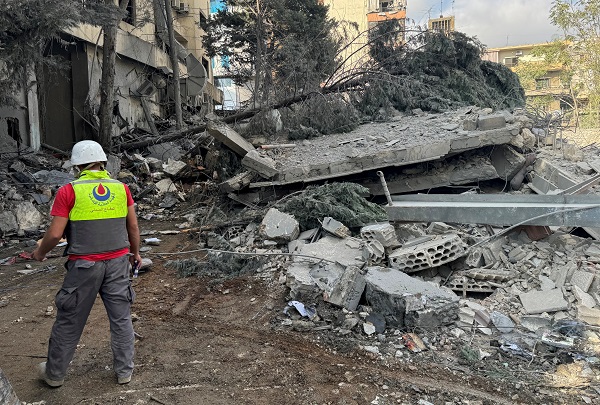 A civil defence member of the Islamic Health Authority walks at a site damaged in an Israeli strike in Nabatieh, amid the ongoing hostilities between Hezbollah and Israeli forces, southern Lebanon, 16 October 2024;
Credit: Reuters/Ali Hankir
A civil defence member of the Islamic Health Authority walks at a site damaged in an Israeli strike in Nabatieh, amid the ongoing hostilities between Hezbollah and Israeli forces, southern Lebanon, 16 October 2024;
Credit: Reuters/Ali Hankir
BEIRUT (Reuters) - The mayor of a major town in south Lebanon was among sixteen people killed when an Israeli airstrike destroyed its municipal headquarters in the biggest attack on an official Lebanese state building since the Israeli air campaign began.
Lebanese officials denounced the incident, which also wounded more than 50 people in Nabatieh, a provincial capital, saying it was proof that Israel's campaign against the Hezbollah armed group was now shifting to target the Lebanese state.
The Israelis "intentionally targeted a meeting of the municipal council to discuss the city's service and relief situation" to aid people displaced by the Israeli campaign, caretaker Prime Minister Najib Mikati said.
Israel launched its ground and air campaign in Lebanon to dismantle Hezbollah after a year during which the Iran-backed militant group fired across the border in support of Palestinian militants Hamas in Gaza.
European Union commissioner for crisis management, Janez Lenarcic, said Israel's "brutal response" to the Hamas attack that started the war had resulted in a devastating humanitarian crisis in Gaza that was now continuing in Lebanon.
"Humanitarian workers have been targeted and killed, hundreds of them. There is no security and safety for humanitarian work to be organised in satisfactory manner," he told Reuters on the sidelines of an ASEAN event in Jakarta, describing the provision of humanitarian supplies as "grossly insufficient".
Fears of a regional conflict have grown after Israel promised to retaliate for an Iranian missile attack on 1 October 2024.
On Wednesday 16 October 2024, the US said it struck five underground weapons storage locations in Houthi-controlled areas of Yemen, the latest in more than a dozen US attacks on Houthi-linked targets this month.
Iran-aligned Houthi fighters in Yemen who say they are acting in solidarity with Palestinians in Israel's year-long war in Gaza have carried out nearly 100 attacks on ships crossing the Red Sea since November.
Israel also launched strikes at Syria's Mediterranean port city of Latakia early on Thursday 17 October 2024, Syrian state media reported.
Evacuation notice
Israel first issued an evacuation notice for Nabatieh, a city of tens of thousands of people, on 3 October 2024. At the time, the city's Mayor Ahmed Kahil told Reuters he would not leave.
Asked about the Israeli strike on Nabatieh, State Department spokesperson Matthew Miller declined to comment on the circumstances of specific attacks but said the US understands Hezbollah operates from places including civilian homes and supported limited strikes to target the group.
"Obviously, we'd not want to see entire villages destroyed. We don't want to see civilian homes destroyed," Miller said.
Israel said on Wednesday it struck dozens of Hezbollah targets in the Nabatieh area and its navy also hit dozens of targets in southern Lebanon.
It said it had dismantled a tunnel network used by Hezbollah's elite Radwan Forces in the heart of a town near the border with Israel, publishing a video showing multiple explosions rocking a cluster of buildings. Lebanese officials said it was the small town of Mhaibib.
Israeli operations in Lebanon have killed at least 2,350 people over the last year, according to the health ministry, and more than 1.2 million people have been displaced. The death toll does not distinguish between civilians and combatants but includes hundreds of women and children.
Around 50 Israelis, both soldiers and civilians, have been killed in the same period, according to Israel.
Peacekeepers report more fire
The UN mission in Lebanon (UNIFIL) said its peacekeepers observed an Israeli tank firing at their watchtower near southern Lebanon's Kfar Kela on Wednesday morning. Two cameras were destroyed, and the tower was damaged, UNIFIL said.
Israel's military said the incident, the latest in a number of attacks that UNIFIL says have targeted its troops, was under investigation.
"UNIFIL infrastructure sites and forces are not a target and every irregular incident will be thoroughly examined," the military said, adding that Hezbollah has been operating from "sites that have been built within and adjacent to UNIFIL posts for many years".
Israel has previously called on the United Nations to move members of the UNIFIL peacekeeping force in southern Lebanon out of the combat zone for their safety.
Israeli Defence Minister Yoav Gallant, on a visit to northern Israel near the border, said Israel would not halt its assault on Hezbollah to allow negotiations.
"We will hold negotiations only under fire. I said this on day one, I said it in Gaza and I am saying it here," he said according to a statement from his office.
Pentagon chief Lloyd Austin on Wednesday spoke to Gallant and "reinforced the importance of taking all necessary measures to ensure the safety and security of UNIFIL forces and the Lebanese Armed Forces," according to the Department of Defense.








